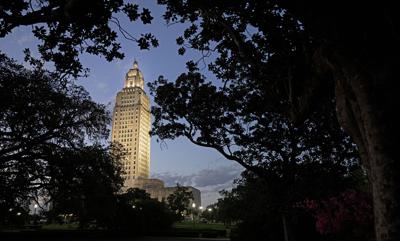Change typically comes slowly, if at all, in Louisiana. How long have citizens demanded an improved Calcasieu River bridge? Or fixes to the Office of Motor Vehicles? Or a reversal of outmigration by college graduates?
That's why many struggle to keep up with the frenetic pace of tectonic changes sought by Gov. Jeff Landry in his first three months in office.
Landry began with a court-ordered special session on congressional redistricting on Jan. 15 — and some surprises in his session call. The most dramatic was his push for closed party primaries for most elected offices. Among that session's bills he signed into law was one that effectively eliminated the congressional district of U.S. Rep. Garret Graves, a political rival.
Up next was his special session on crime, which began Feb. 19. It produced 11 more bills that became law — among them permitless concealed carry, the use of nitrogen hypoxia for executions, the abolition of parole and a slew of other changes whose impact on state finances and the criminal justice system continue to be debated.
In the regular session that began March 11, lawmakers have filed more than 1,400 bills. They include measures to create "education scholarship accounts" that would divert public money to nonpublic schools; to subsume the Coastal Protection and Restoration Authority under the Department of Energy and Natural Resources; and to dramatically change how insurance companies can treat Louisiana homeowners.
But wait, there’s more.
Landry also has called for a constitutional convention to rewrite our state's charter. He wants the convention to begin May 20 — two weeks before the regular session is set to end — and conclude a mere eight weeks later.
We understand every new administration’s desire to take the reins decisively and pursue its priorities. No one is surprised that, after eight years with a Democratic governor, conservatives relish the opportunity to put their stamp on state government.
We and many others also agree that Louisiana’s constitution is too cluttered with minutiae. We have previously lamented that many proposed constitutional amendments reflect a failure to legislate effectively.
But we fear that a hastily called, drive-by constitutional convention would create more problems than it solves.
First, the governor hasn’t revealed what, exactly, convention delegates would address. Lawmakers and citizens have seen no draft of a revised charter.
Second, even though voters could approve or reject any proposed changes in November, we feel that a proper constitutional convention should offer numerous opportunities for public input, including from diverse constituencies.
In 1973, the last time Louisiana had a constitutional convention, the elected delegates were fiercely independent of then-Gov. Edwin Edwards, who campaigned on replacing the 1921 constitution. This year, under House Bill 800, no delegates would be elected for the convention. Instead, the delegates would include the 105 House and 39 Senate members, plus 27 Landry appointees. The Legislature's Republican supermajority reflects the GOP's effectiveness at electing lawmakers, but it does not fully reflect Louisiana's population.
Third, eight weeks is nowhere near enough time to rewrite an entire constitution, especially one that includes popular protections such as the homestead exemption, civil service, local home rule, caps on state income taxes and more.
Besides, after trudging through three back-to-back-to-back sessions since mid-January, we doubt lawmakers want to continue working through midsummer.
It has been a dizzying 90 days since Landry took office. Whether you like or dislike his priorities, we all should agree that good governance requires deliberation, transparency and consensus-building that puts citizens' interests first.
Yes, Louisiana needs to revise or rewrite its constitution — but a whirlwind convention with virtually no public input will likely leave us no better off than we are now. And maybe worse.

